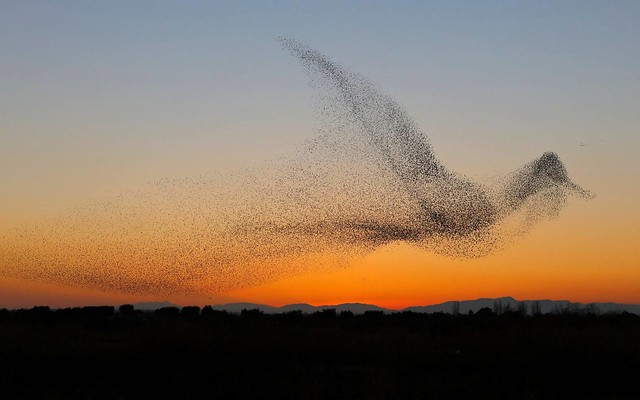Costas
¥
Απλώς το άκουσα σήμερα το πρωί στο BBC, δεν έχω κάνει καμιά έρευνα για το αν υπάρχει κάτι ελληνικό, αλλά το θέαμα είναι γνωστό και υπέροχο, και το βάζω εδώ να υπάρχει. Πρόκειται για τα κοπάδια των ψαρονιών (starlings) με τα γνωστά μοτίβα κίνησης, που βλέπουμε και στα μέρη μας. Το BBC έλεγε πως ο αριθμός τους στη Βρετανία έχει μειωθεί πολύ τις τελευταίες δεκαετίες.
OED:
¶2.2 A term for a flock (of starlings).
One of many alleged group terms cited in the first source: revived and popularized in the 20th c.
c 1470 in Hors Shepe & G. etc. (Caxton 1479, Roxb. repr.) 30 A murmeracion of stares. 1932 Auden in New Statesman 16 July 69/1 Patterns a murmuration of starlings Rising in joy over wolds unwittingly weave. 1938 Times 6 Jan. 15/5 Great murmurations of starlings are often represented as a peculiar phenomenon of our own times. 1946 M. Peake Titus Groan 306 The clearing ended where a derelict stone building‥held back a grove of leafless elms, where a murmuration of starlings was gathered. 1966 Sunday Mail Mag. (Brisbane) 6 Mar. 6/4 Starlings when they're on the wing have to labor under the collective title of murmuration.
OED:
¶2.2 A term for a flock (of starlings).
One of many alleged group terms cited in the first source: revived and popularized in the 20th c.
c 1470 in Hors Shepe & G. etc. (Caxton 1479, Roxb. repr.) 30 A murmeracion of stares. 1932 Auden in New Statesman 16 July 69/1 Patterns a murmuration of starlings Rising in joy over wolds unwittingly weave. 1938 Times 6 Jan. 15/5 Great murmurations of starlings are often represented as a peculiar phenomenon of our own times. 1946 M. Peake Titus Groan 306 The clearing ended where a derelict stone building‥held back a grove of leafless elms, where a murmuration of starlings was gathered. 1966 Sunday Mail Mag. (Brisbane) 6 Mar. 6/4 Starlings when they're on the wing have to labor under the collective title of murmuration.



